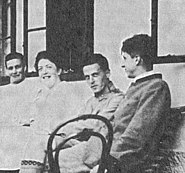From Wikipedia, the free encyclopedia
This is one of a collection of articles which has a direct, or indirect relevance for the development of the UDP. Blogger Ref http://www.p2pfoundation.net/Universal_Debating_Project
This article is about the philosophical concept. For systems of language obfuscation such as Pig Latin, see Language game.
| Part of a series on |
| Ludwig Wittgenstein |
|---|
|
Wittgenstein (second from right), Summer 1920
|
| Early philosophy |
| Later philosophy |
| Movements |
| Works |
| People |
| Interpreters |
| Other topics |
Contents
[hide]Description[edit]
In his work, Philosophical Investigations, Ludwig Wittgenstein regularly referred to the concept of language games.[1] Wittgenstein rejected the idea that language is somehow separate, and corresponding to reality and argued that concepts do not need to be clearly defined to be meaningful.[2] Wittgenstein used the term "language-game" to designate forms of language simpler than the entirety of a language itself, "consisting of language and the actions into which it is woven" (PI 7), and connected by family resemblance (Familienähnlichkeit). The concept was intended "to bring into prominence the fact that the speaking of language is part of an activity, or a form of life" (PI 23) which gives language its meaning.The term 'language game' is used to refer to:
- Fictional examples of language use that are simpler than our own everyday language. (e.g. PI 2)
- Simple uses of language with which children are first taught language (training in language).
- Specific regions of our language with their own grammars and relations to other language-games.
- All of a natural language seen as comprising a family of language-games.
Examples[edit]
The classic example of a language-game is the so-called "builder's language" introduced in §2 of the Philosophical Investigations:| “ | The language is meant to serve for communication between a builder A and an assistant B. A is building with building-stones: there are blocks, pillars, slabs and beams. B has to pass the stones, in the order in which A needs them. For this purpose they use a language consisting of the words "block", "pillar" "slab", "beam". A calls them out; — B brings the stone which he has learnt to bring at such-and-such a call. Conceive this as a complete primitive language. (PI 2.)[3] | ” |
Postmodernist interpretation[edit]
Jean-François Lyotard explicitly drew upon Wittgenstein's concept of language-games in developing his own notion of metanarratives in The Postmodern Condition. However, Wittgenstein's concept is, from its inception, of a plurality of language games; their plurality is not taken to be a feature solely of contemporary discourse. Lyotard's discussion is primarily applied in the contexts of authority, power and legitimation, where Wittgenstein's is concerned to mark distinctions between a wide range of activities in which language users engage.References[edit]
- Jump up ^ Biletzki, Anat (8 November 2002; substantive revision 23 December 2009). "Ludwig Wittgenstein". Stanford Encyclopedia of Philosophy. Retrieved April 4, 2012. Check date values in:
|date=(help) - Jump up ^ Jago 2007, p. 55
- Jump up ^ Michael Foord. "Wittgenstein Philosophical Investigations - Aphorisms 1-10". Voidspace.org.uk. Retrieved 2013-12-12.
Sources[edit]
- Jago, Mark (2007). Wittgenstein. Humanities-Ebooks.
- Wittgenstein, Ludwig (1953). Philosophical Investigations. Blackwell.
- Wittgenstein, Ludwig (1942). Blue and Brown Books. Harper Perennial.
Further reading[edit]
- Nicolas Xanthos (2006), "Wittgenstein's Language Games", in Louis Hébert (dir.), Signo (online), Rimouski (Quebec, Canada)
- Philosophical Investigations
- Language-games and Family Resemblance A description of language-games in the entry for Ludwig Wittgenstein in Stanford Encyclopedia of Philosophy
- Logico-linguistic modeling. This is an application of the language-game concept in the area of information systems and knowledge-based system design.
- Forms of Life and Language Games (2011)
| ||

No comments:
Post a Comment